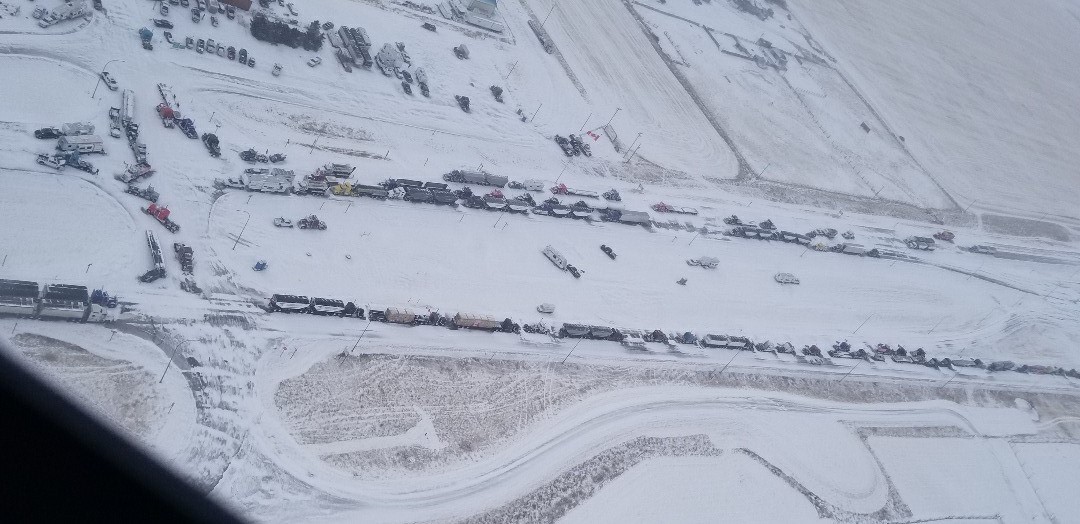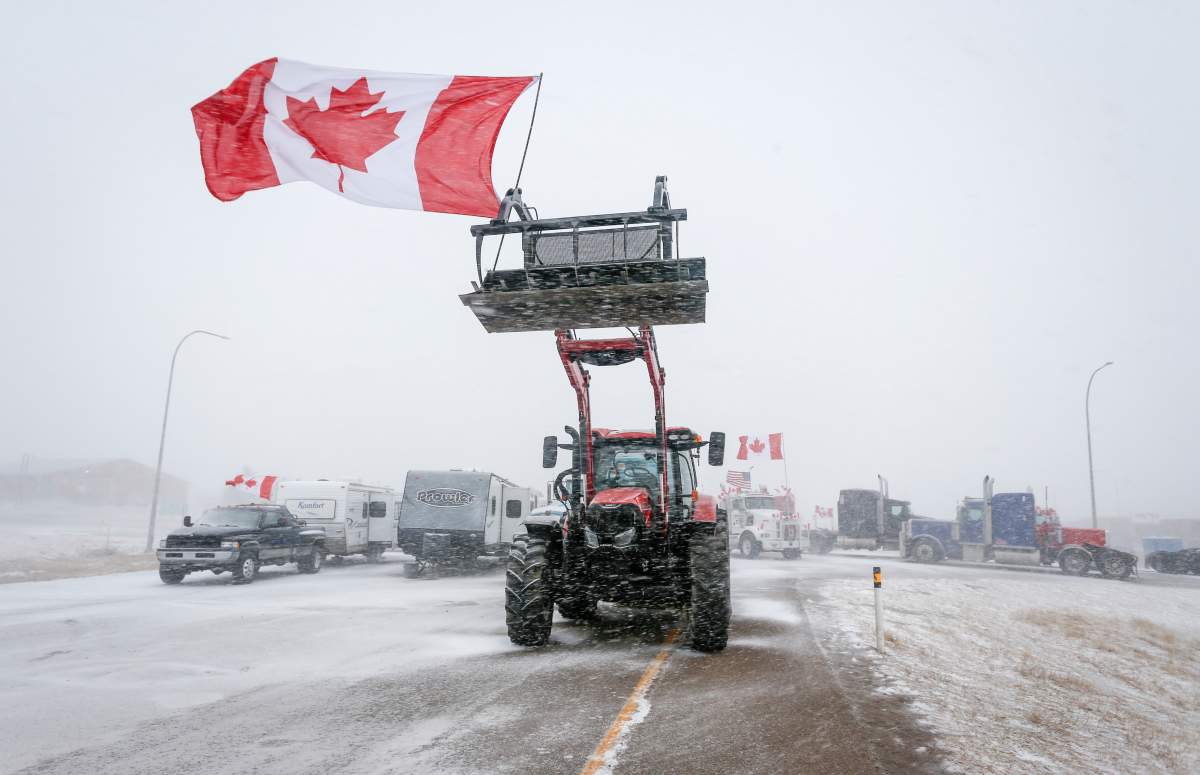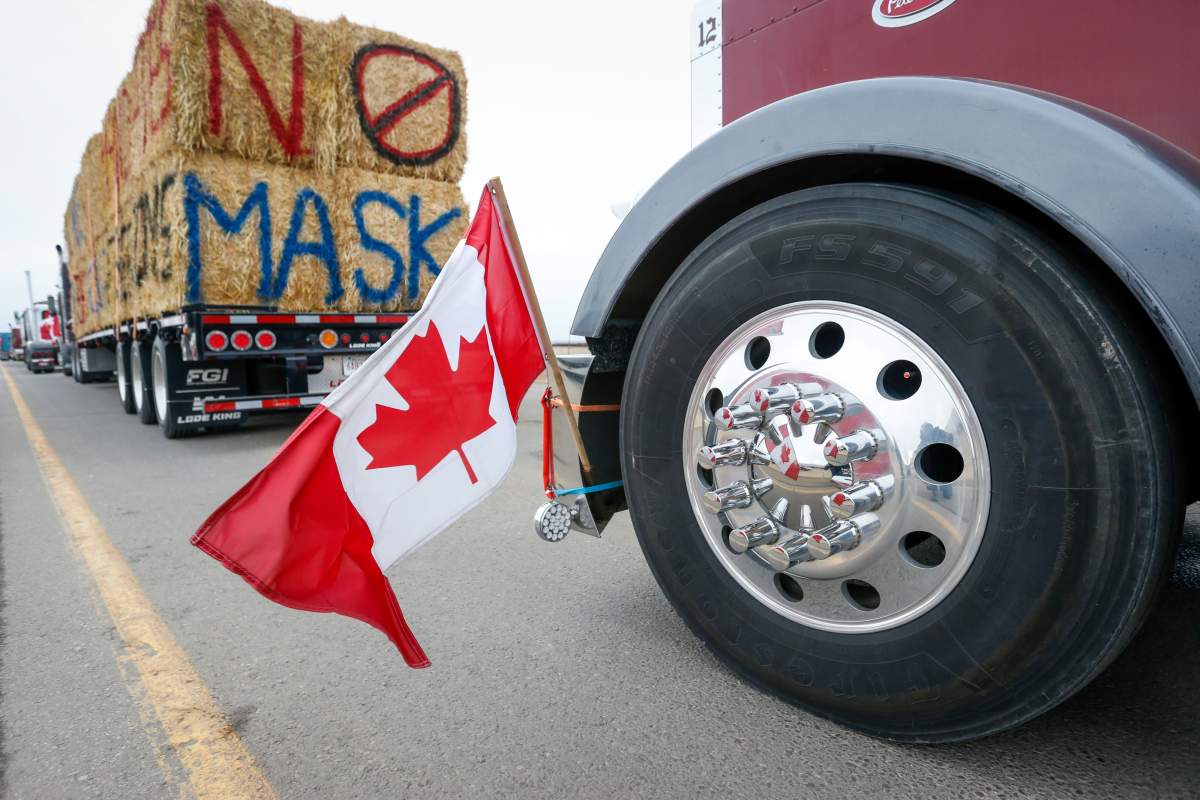A trucker blockade in southern Alberta at the United States border turned violent Tuesday after some protesters breached police barriers to join the demonstration and some Mounties were reportedly attacked.

“I’ve received reports in the last hour of people aligned with the protesters assaulting RCMP officers, including one instance trying to ram members of the RCMP, later leading to a collision with a civilian vehicle,” said Premier Jason Kenney in a news conference that began around 4:30 p.m.
“This kind of conduct is totally unacceptable.
“Without hesitation, I condemn those actions and I call for calm.”

RCMP were not immediately available to comment on the assaults.
Events moved swiftly after RCMP announced Tuesday afternoon that negotiations to have the protesters leave on their own had failed and it was time to enforce the law at the Coutts, Alta., crossing.
As teams of officers approached truck cabs, some drivers began slowly peeling off and heading away.

At the same time, however, north of Coutts, other protesters breached a police barricade and drove down the highway to join the blockade.
Two of those protesters were seen in tractors with Canadian flags, racing down a ditch along the highway.
Police said what may have begun as a peaceful assembly quickly turned into an unlawful blockade and though they’ve tried to find a resolution, protesters have chosen not to comply.
Under the Critical Infrastructure Defence Act, a highway is considered essential infrastructure. Those who “wilfully obstruct, interrupt or interfere with the construction, maintenance, use or operation of any essential infrastructure in a manner that renders the essential infrastructure dangerous, useless, inoperative or ineffective” could be arrested and/or charged, RCMP said.
“We (began) to remove some vehicles from the protest area. A few left. I didn’t get an exact count of how many went out. And then we received notification that additional protesters were arriving on the scene and came around our secured area,” said RCMP Cpl. Curtis Peters.
The blockade has snarled and stalled traffic at the border crossing since Saturday, leaving travellers and truckers on both sides stranded and locals unable to access goods and services, including medical care.
The RCMP noted that while peaceful assembly is allowed, the demonstrators were contravening federal and provincial laws that forbid anyone from impeding access to critical infrastructure.

Kenney condemns blockade, RCMP assault
Kenney said the situation in Coutts remained fluid and urged travellers to use border crossings at other points of entry in the province.
The premier said he is working with the federal government to see if they can extend service and working hours at those locations.

Get daily National news
“We can expect there will continue to be some interruption at the Coutts border crossing perhaps for some time to come as the RCMP deals with the road blockage there,” said Kenney.
In his first news conference since the start of the border blockade in his province, Kenney both condemned and encouraged those protesting public health mandates.
But he said he had no plans to meet with protesters in the blockade.
“I’m not going to cross-thread myself with the operational decisions of the police, I think that would be unhelpful,” the premier said.
“The RCMP did attempt to have a dialogue. They had their specialists engaging protest groups and they thought they were getting somewhere.”
The premier said he, the acting justice minister and transportation minister received a briefing from the RCMP on the weekend’s events and on Tuesday, he shared a report of protesters allegedly trying to assault RCMP officers, including with a vehicle.
“Without hesitation, I condemn those actions and I call for calm among anybody who feels sympathetic to those engaged in this blockade.”
He said he sympathized with the “vast majority of lawful protestors,” adding it is “unfortunate to see a small number break the law, create a public safety hazard and enormous inconvenience for law-abiding Canadians.”
“I understand the concerns and frustrations that (protesters) have. And for those opposed to the quarantine requirement for (truckers to cross the border), not only do I hear you, but I agree with you.”
Kenney and acting Justice Minister Sonya Savage said there was no need for a court injunction against the blockade.
“You don’t need an injunction to uphold the law,” the premier said.

The demonstration started in solidarity with demonstrations countrywide and in Ottawa against cross-border truckers having to be vaccinated against COVID-19 and other public health measures.
Early Tuesday, the line of trucks had thinned out but still stretched two abreast as far as the eye could see in chilling wind and -20 C temperatures.
Canadian flags flew from some trucks. Others sported upside-down Maple Leafs and homemade signs and placards: “True North Strong Proud and Free.” “Mandate Freedom or Liberation is Coming.” “No Fear, Freedom Rules.”
Coutts Mayor Jim Willett has said the protest was isolating the village’s 250 residents.
Mail delivery had been stopped and some children were forced to stay home from school Monday because their bus could not get into the community. There were reports of residents not receiving at-home medical care.

The blockade also left truckers stranded in the U.S.
Lovepreet Singh said he arrived in Edmonton on Tuesday after waiting in Montana with 150 other trucks and a full load of fruit and vegetables for more than two days.
Singh said it was a frustrating wait that put the health of some truckers at risk.
“That’s not how Canadians behave,” said Singh in an interview.
“There are people (who) have medical issues like blood pressure issues, thyroid issues, asthma.”
He said many of those waiting ate pizza every day from a nearby store while listening to a constant refrain from police to sit tight and wait.
Singh said he eventually detoured through icy roads in British Columbia at a cost of seven extra hours and $400 in gas.
Some truck drivers who left earlier risked driving through snow squalls, he said. One rig hit the ditch.
“We don’t make enough money to survive in these kinds of situations,” said Singh.
“It’s even hard for us to pay all the bills and (provide) for our family.”
Alberta NDP call on government to act
Alberta NDP transportation critic Lorne Dach, along with Edmonton-Meadows MLA Jasvir Deol, held a virtual news conference Tuesday afternoon.
The pair was joined by two other truck drivers who were stuck on the U.S. side of the border: Sam Chahal and Kulwant Singh.
“Both the RCMP and the premier have called this blockade illegal, but members of the UCP government caucus have participated in this illegal blockage and cheered it on — this is totally unacceptable and MLAs Shane Getson and Grant Hunter cannot continue to sit in the government caucus,” Deol said.
“This blockade has obstructed emergency access to goods and it’s preventing children from going to schools, they are harming Alberta’s economy, and they have left many working professionals stranded on both sides of border.”

Both Chahal and Singh spoke via Zoom inside their trucks, where they said the line was getting very long near Coutts.
It is the only border crossing in the province where live animals are permitted, along with it being the direct route for the major Alberta beef packing plants and feedlots.
”This is a lot (of) cost burden for us,” Chahal said when explaining that the truck loads were planned prior to the trucker convoy — meaning there was no time to cancel the initial pickup down in the U.S.
Chahal said had they known the protest would cause the border to be closed off, truck drivers would have been able to charge extra for the added fuel, food and supplies needed; however, because they were expecting the border to stay open, many are incurring those costs that they likely won’t get back.
“Sometimes the trip is only 200-300 kilometres in total but if we have to divert to a new border crossing, it becomes up to 1,100 to 1,200 kilometres which (means) the trip is going to take about two days with a job that could be finished within three hours.”
Ending protests a ‘delicate’ task: Law professor
One Alberta law professor said the negotiating an end to mass protests is a “delicate moment,” saying law enforcement officers’ first tactic is de-escalation.
“That’s always going to work better than mass arrests for the very reason that simply moving in and sending everybody off to prison immediately may in fact escalate the situation, may draw more supporters to the protest and may make the situation worse, not better,” University of Alberta law professor Eric Adams said.

“Police know through tried and true trial and error that, at the end of the day, it’s often in the public interest to try as best as you can to negotiate an end to these moments, even if it is painful and even if it is slow,” Adams added.
“At the end of the day, it might work better in keeping the border open in the weeks and months to come.
“It’s an art, not a science, to ending protests.”
— With files from Adam Toy and Jessika Guse, Global News, and Fakiha Baig, The Canadian Press







Comments
Want to discuss? Please read our Commenting Policy first.